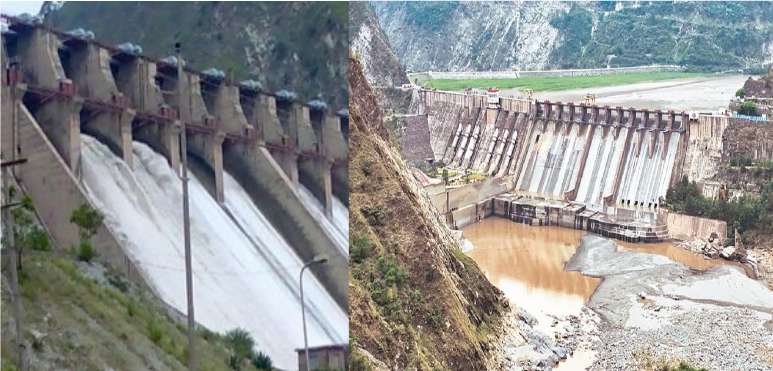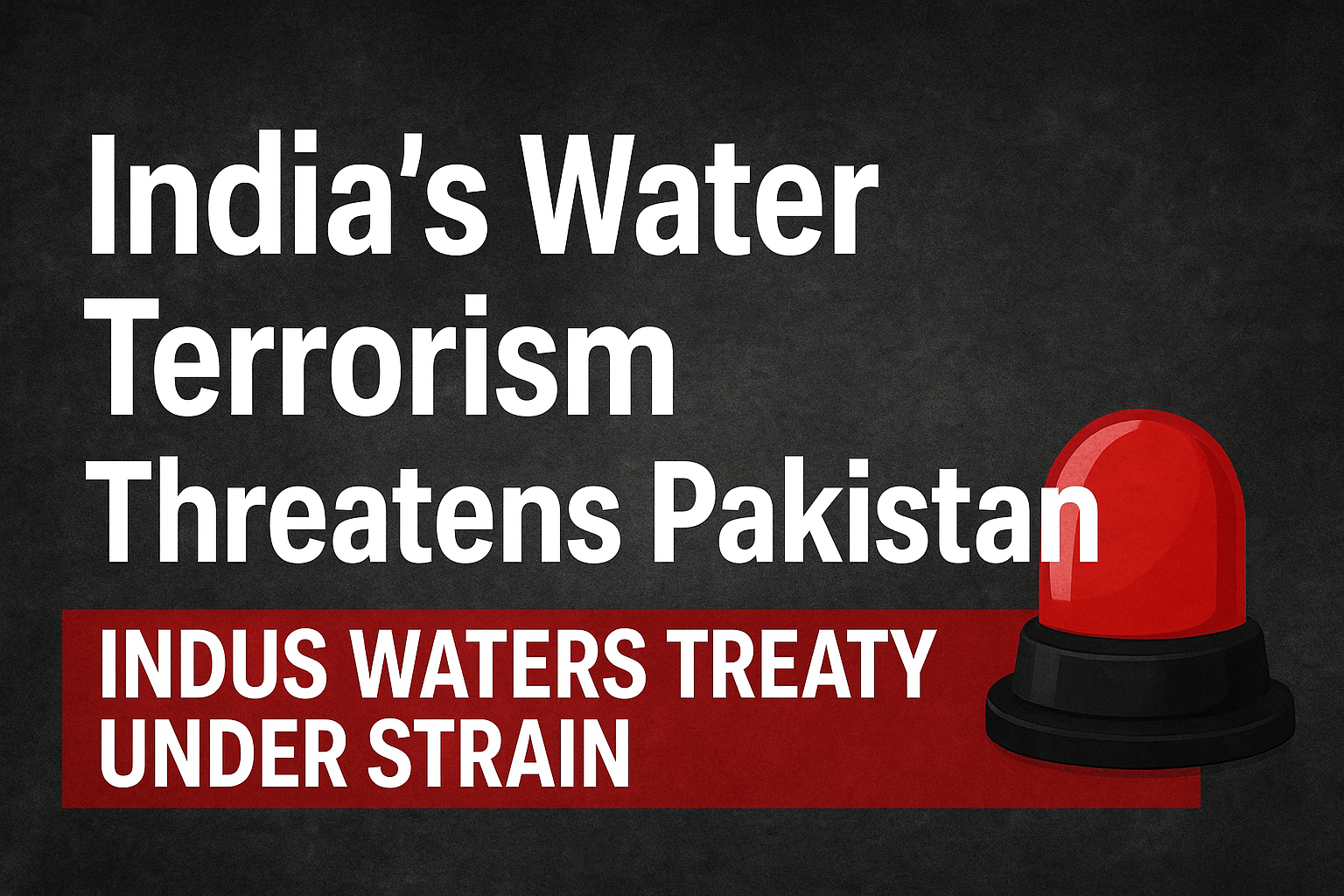India’s water terrorism threatens Pakistan as river flows drop, straining the Indus Waters Treaty. Explore impacts on food, energy, security & regional peace.
India’s water terrorism has become an alarming issue for South Asia, raising concerns over peace, security, and sustainability in the region. At the center of the debate is the Indus Waters Treaty (IWT), a landmark agreement signed in 1960 that governs the use of rivers shared between Pakistan and India. Recent developments, including India’s unilateral decision to reduce river flows into Pakistan, have heightened tensions and sparked fears of an escalating water crisis. Analysts warn that the use of water as a strategic tool or “weapon” could destabilize the region, affecting agriculture, food security, energy production, and ecological balance.
Background: The Indus Waters Treaty
The Indus Waters Treaty, signed on 19 September 1960 in Karachi, was brokered by the World Bank between Pakistan’s then-President Ayub Khan and Indian Prime Minister Jawaharlal Nehru. The treaty divided the rivers of the Indus Basin between the two countries. Under the agreement, Pakistan received rights over the three western rivers — Indus, Jhelum, and Chenab — while India retained control of the three eastern rivers — Ravi, Beas, and Sutlej. This arrangement was considered unique because it created a clear division rather than shared management, minimizing disputes in theory. Over the decades, despite wars, military stand-offs, and political differences, the Indus Waters Treaty has survived, making it one of the most durable water-sharing agreements in the world. However, the treaty also allows India limited rights to use western rivers for non-consumptive purposes such as hydropower generation. It is this clause that has often been a source of contention, as Pakistan argues that India’s dam-building projects exceed the permissible limits and threaten its downstream water security.
India’s Recent Move to Block Water
In May 2025, reports confirmed that India curtailed the flow of water from the Baglihar Dam located on the Chenab River in Jammu and Kashmir. The reduction in water directly impacted Pakistan’s irrigation and water availability downstream. According to Pakistan’s Irrigation Department, water inflows at Head Marala, a critical control structure near Sialkot, dropped sharply from 87,000 cusecs to only 10,800 cusecs. This drastic fall triggered immediate concerns in Pakistan’s agricultural and water management sectors. Pakistani officials described the action as a clear violation of the Indus Waters Treaty and categorized it as “water terrorism.” The term has gained traction in South Asian policy circles, highlighting the severity of using natural resources as tools of pressure or coercion. India, on the other hand, maintains that its projects are within the framework of the treaty. However, independent analysts point out that repeated episodes of water flow reductions indicate a trend of aggressive water management, which threatens regional trust and stability.

Impact on Pakistan
The immediate and long-term effects of reduced river flows into Pakistan are significant. Agriculture: Pakistan’s economy is highly dependent on agriculture, which consumes more than 90% of the country’s freshwater resources. Reduced water availability directly threatens major crops such as wheat, rice, and sugarcane, which are essential not only for domestic consumption but also for export revenues. A decline in river flows during critical sowing or harvesting seasons can lead to sharp production losses. Energy Security: Hydropower forms an essential part of Pakistan’s renewable energy sector. With reduced river flows, the capacity of hydropower plants decreases, leading to higher reliance on imported fuels and increased energy costs. This adds pressure to an already struggling energy infrastructure. Food Security and Prices: A decline in crop yields can cause shortages of staple foods, driving up prices. Food inflation disproportionately affects low-income households, aggravating poverty levels. Water scarcity combined with population growth poses a long-term challenge for Pakistan’s food security. Environmental Consequences: River ecosystems depend on consistent flows to sustain biodiversity, fish habitats, and wetland systems. Reduced flows threaten freshwater species, deteriorate water quality, and accelerate desertification in river-adjacent areas. Environmental stress also impacts rural livelihoods that depend on fishing, farming, and forestry.
Potential Future Threats
Beyond the Baglihar Dam issue, there are growing concerns about other Indian hydropower and water storage projects on the western rivers. One of the most debated projects is the Kishanganga Dam on the Jhelum River. Reports suggest that India could similarly manipulate flows, reducing Pakistan’s water share during critical agricultural cycles. Such actions would exacerbate water shortages in northern Punjab and other downstream areas that rely heavily on the Jhelum for irrigation. Experts also warn that with climate change accelerating glacial melt in the Himalayas, water availability is already becoming unpredictable. If coupled with human-induced restrictions, this could magnify the risk of seasonal droughts and floods in Pakistan. Long-term water scarcity could lead to internal displacement, rural poverty, and increased dependence on international food imports.
India’s Water Terrorism Threatens Pakistan – Pakistan’s Response
The Government of Pakistan has raised the issue at multiple levels. The National Security Committee (NSC) declared India’s move to reduce Chenab flows a “hostile act tantamount to war.” The statement underscored the severity with which Pakistan views unilateral actions that compromise its water rights. Islamabad has announced plans to pursue a diplomatic and legal response through international forums, including the International Court of Arbitration and the World Bank, which remains a guarantor of the Indus Waters Treaty. In July 2023, the Permanent Court of Arbitration in The Hague ruled in favor of Pakistan in a related dispute, reaffirming that the treaty remains legally binding and that neither party can suspend or terminate it unilaterally. This decision strengthens Pakistan’s case in challenging India’s recent actions. Pakistan is also working on strengthening its internal water management policies. Authorities have emphasized the need for expanding water storage capacity through new dams and improving irrigation efficiency to minimize water wastage.
Conclusion: India’s Water Terrorismd Threatens Pakistan
The concept of water being used as a weapon is no longer theoretical. India’s actions at Baglihar and potential measures at Kishanganga highlight the strategic use of natural resources to exert pressure on Pakistan. This not only undermines the Indus Waters Treaty but also threatens the delicate balance of peace and cooperation in South Asia. Water terrorism, if unchecked, could push the region toward heightened conflict, with devastating consequences for nearly 1.6 billion people living in the basin. Pakistan’s reliance on the Indus system for agriculture, energy, and daily life makes it particularly vulnerable to any disruption. Moving forward, Pakistan must expand water storage capacity by constructing new reservoirs, invest in modern irrigation systems to reduce water losses, promote regional water diplomacy to secure international support, and raise global awareness about the risks of weaponizing water. The crisis serves as a stark reminder that water security is inseparable from national security. Without cooperative frameworks and strict adherence to international treaties, the future of South Asia’s stability will remain uncertain.
Quick Facts Table
| Aspect | Details |
|---|---|
| Treaty | Indus Waters Treaty, 1960 (World Bank–brokered) |
| Violation | Baglihar Dam – Chenab flow reduced drastically |
| Water Flow | 87,000 → 10,800 cusecs at Head Marala |
| Impact | Agriculture, energy, food security, environment |
| Future Risk | Kishanganga Dam on Jhelum River |
| Pakistan’s Stance | “Water terrorism” & violation of international law |
| World’s Position | Treaty still valid, cannot be suspended unilaterally |

